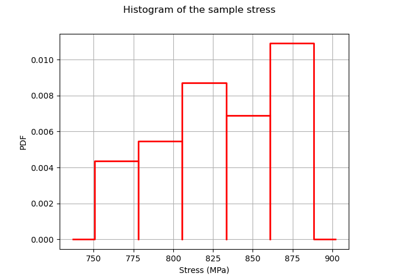The Chaboche mechanical model¶
Deterministic model¶
The Chaboche mechanical law predicts the stress depending on the strain:
where:
is the strain,
is the stress (Pa),
,
,
are the parameters.
The variables have the following distributions and are supposed to be independent.
Random var.
Distribution
Lognormal (
MPa,
MPa)
Normal (
MPa,
MPa)
Normal (
,
)
Uniform(a=0, b=0.07).
Observations¶
In order to create a calibration problem, we make the hypothesis that the strain has the following distribution:
Moreover, we consider a gaussian noise on the observed constraint:
and we make the hypothesis that the observation errors are independent. We set the number of observations to:
We generate a Monte-Carlo samplg with size :
for .
The observations are the pairs
, i.e. each observation is a couple made of the strain and the corresponding stress.
Thanks to¶
Antoine Dumas, Phimeca
References¶
Lemaitre and J. L. Chaboche (2002) “Mechanics of solid materials” Cambridge University Press.
Load the use case¶
We can load this classical model from the use cases module as follows :
>>> from openturns.usecases import chaboche_model as chaboche_model
>>> # Load the Chaboche use case
>>> cm = chaboche_model.ChabocheModel()
API documentation¶
See ChabocheModel.
 OpenTURNS
OpenTURNS
